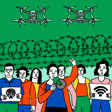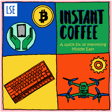
3.10 The Power of Radio
How did the radio, a major technological development in the history of sound and music, change the social, cultural and political landscape of the region?
In this last episode of the season, we speak to audio curator Hazem Jamjoum, and Elias Anastas and Saeed Abu Jaber, two of the co-founders of the Palestinian radio station Radio Al Hara. We find out more about the history of the radio in the region and also it's present – specifically looking at how this new technology was used by imperialists, technocrats, intellectuals and liberation groups to broadcast and connect groups. Through Radio Al Hara's activity, we learn how radio works in similar ways to this day.
Hazem Jamjoum is an audio curator and researcher with an interest in history of audio and music recording in the Arab world
Elias Anastas is a co-founder of Radio Al Hara. He is an architect based in Bethlehem, Palestine and runs an architectural studio with his brother Yousef called AAU ANASTAS. They also run Wonder Cabinet, a not-for-profit cultural platform.
Saeed Abu Jaber is one of the founders of radio al hara. He is a graphic designer and runs a studio called Turbo in Amman, Jordan.



















